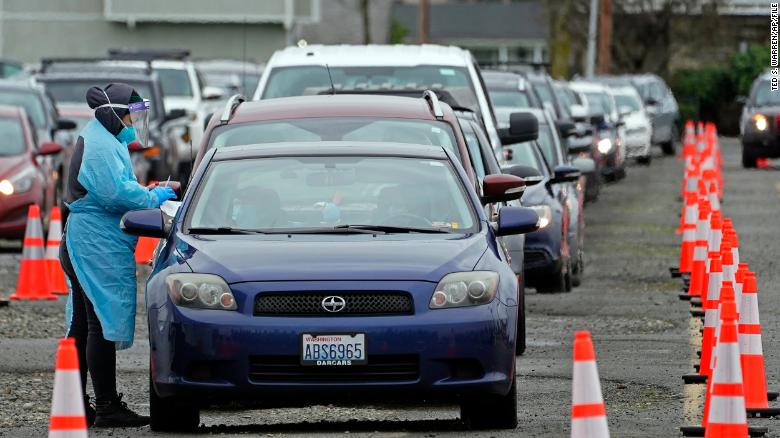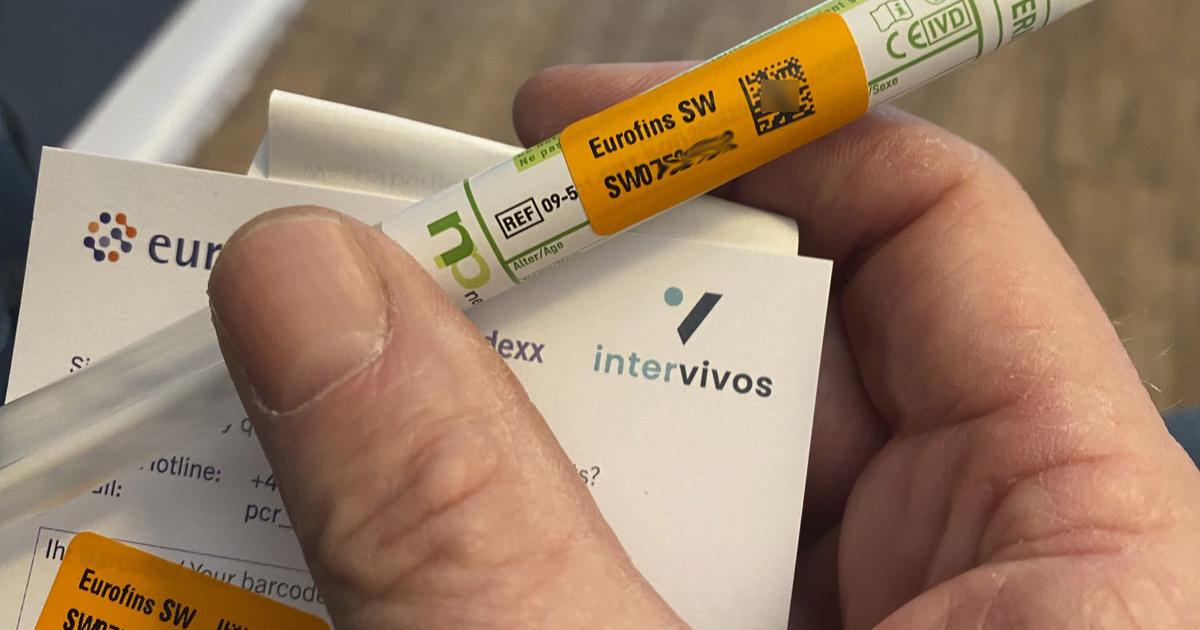Why are there two types of tests for the coronavirus?
2:50
(CNN) --
A PCR test is often considered the gold standard for detecting coronavirus infection.
It's the test some employers want workers to take before returning to work after having Covid-19, and the one some people are rushing to schedule to see if they can travel or stop isolating.
But experts say that the PCR test is not the best for all situations.
PCR, or reverse transcription polymerase chain reaction, tests can detect small amounts of genetic material from the coronavirus in a sample collected from a human. The test then works by amplifying or making copies of that genetic material, if any is present in a person's sample, according to the US Centers for Disease Control and Prevention (CDC).
The test's amplifying property allows it to detect very small amounts of coronavirus in a sample, "making these tests highly sensitive for diagnosing COVID-19," according to the CDC.
While this sensitivity can be advantageous in detecting the coronavirus after recent exposure, it also means that PCR results can be positive even after you are no longer contagious.
A worker at a coronavirus testing clinic administers coronavirus PCR tests in Puyallup, Washington state, on January 4.
(AP Photo/Ted S Warren)
A PCR test might say you're positive for the coronavirus for three to four weeks after you've recovered because "small bits (of the virus) are still amplifying," said CNN medical analyst Dr. Leana Wen. , an emergency physician and visiting professor of Health Policy and Management at the George Washington University Milken Institute School of Public Health.
After seven to 10 days, "that PCR test is not a suitable test."
Regardless of your situation, here's what you need to know about the differences between PCR and antigen tests and when to use them.
advertising
When is a PCR test key?
The best time to do a PCR test is when you've had a confirmed or suspected exposure to someone with COVID-19 or are experiencing symptoms, and you want to know if you have a coronavirus infection, said Dr. Albert Ko, the professor Raj and Indra Nooyi Professor of Public Health at the Yale School of Public Health.
Mass closure in Beijing for an omicron variant case 3:46
Knowing your status as early as possible in an infection can help you determine if you are infectious to others, what to tell recent close contacts for their own safety, and what to share with your doctor so they can educate you about your symptoms and prescribe any medical care if necessary, said Emily Somers, an epidemiologist who holds chairs in internal medicine, environmental health sciences, and obstetrics and gynecology at the University of Michigan schools of medicine and public health.
The US Postal Service is on the ropes to deliver free covid-19 tests from the White House
That's important because "up to two days before symptoms, or one or two days after symptoms (begin), people may be at the highest risk of infecting others," Ko said. When people are initially exposed, the virus takes time to replicate long enough for a test to detect it, Ko explained. PCR tests detect it earlier in the course of infection after exposure than the less sensitive rapid antigen test, which works by detecting a specific protein in one of the peaks of the coronavirus.
When are rapid antigen tests crucial?
Contrary to what some still think is best, a rapid antigen test is what you should get after you've had covid-19 for several days and want to confirm that you're probably no longer infectious to other people. "'Infected' means I have the virus inside me," Ko explained. "'Infectious' means I'm shedding enough virus to infect another person, and that only happens during a spike."
Current CDC isolation guidance says that if people have access to a coronavirus test and want to take it, the best approach is to use a rapid test toward the end of their five-day isolation period.
Those who continue to test positive at that time must continue to isolate until they are 10 days after their symptoms began.
People who test negative can stop isolating but must wear a mask around others until day 10.
"Although the rapid (antigen) test has low sensitivity and is inferior to the PCR test in telling you if you have been infected, due to its lower sensitivity, it only detects viruses at a higher level and probably levels that are more infectious," Ko explained. .
"Right now, we don't have an FDA-approved test that can tell us exactly" how much virus it takes to be infectious to other people, Ko added. But the evidence has led public health experts to think rapid tests work. better than PCR tests at capturing when people are exiting the period of peak infectiousness, as PCR tests are too sensitive, he said.
How to get free covid-19 tests in the US 2:19
"We have other data to indicate at what point someone is no longer infectious," Wen said.
A UK preprint study published in December 2021 found that after five days of coronavirus infection, 31% of people were still infectious.
On day eight, that percentage dropped to 11% and continued to decline over the next few days.
Testing requirements to visit nursing homes leave families trapped in 'another lockdown'
"Having two rapid tests, two days in a row, coming back negative is a very good indicator that a person is no longer infectious," Somers said.
This doesn't mean that being contagious at this point is totally impossible, it just means that once you've had covid-19 for several days and then come back negative with a rapid antigen test, the viral RNA is likely to be at low enough levels. enough to not be infectious (even if you still test positive on a PCR test).
There have been many reports online of employers requiring people to show a negative PCR test before returning to work, which is "probably not coherent thinking" and results in people not returning to work until weeks after their test. initial rapid antigen test, or PCR, Ko said.
Fake Covid-19 testing sites put consumers at risk, officials say as they struggle to keep up
"As with any test for anything, if you use it for the wrong purpose, you will get an inappropriate result," Wen added.
However, "if someone has had multiple negative antigen tests, but has symptoms of covid, getting a PCR test can help confirm whether or not they have it."
CNN's Kaitlan Collins, John Bonifield, Nikki Carvajal, Eric Levenson and Arman Azad contributed to this story.
PCR covid-19 tests











